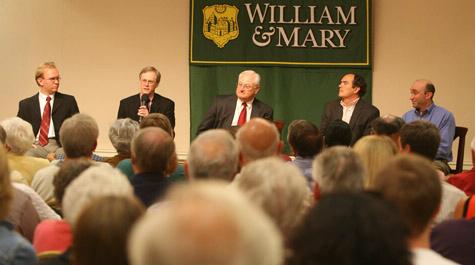W&M experts cast light on financial crisis
The current financial crisis gripping the United States and reaching into all areas of the global markets likely will be severe but will not reach the proportions experienced during America’s Great Depression, according to faculty experts at the College of William and Mary.
The professors made their views known during a panel discussion attended by more than 250 people on Oct. 15 in the Office of Admission auditorium. An additional 200 people viewed the forum offsite via streaming Web video.
Moderator Dick Ash, clinical professor of entrepreneurship and private equity at the College’s Mason School of Business, opened the forum by suggesting, “We may have some breaks in the system, but it is not doomed.” Although recovery will be a long-term process, he said that the opinions that would be expressed would lead to a more reasoned understanding of the problems.
“Do yourself a favor,” Ash said. “Stop listening to all the talking heads. Everybody has an opinion. … Make your own decisions.”
Panelists included John Boschen, Brinkley-Mason professor at the business school, John Merrick, the Richard S. Reynolds Associate Professor of Business, Eric Kades, professor of law, and Till Schreiber, assistant professor of economics.
Boschen concentrated his remarks on the housing markets. “It is where the crisis started and where it will end,” he said.” While household income grew at about 4 percent during recent years, the cost of housing was growing about four-times that amount, he pointed out. “Sooner or later, housing prices have to come back in line with people’s incomes,” he said. “People have to be able to afford to buy houses.”
Schreiber said that the U.S. crisis was, in reality, a global crisis that was beginning to be felt in the “real” economy. Layoffs and lack of access to credit on the part of small businesses were among factors contributing to what he predicted would be hard times in the short term. The audience responded positively when he suggested that graduating students would do well to seek employment as regulators as opposed to more traditional jobs in the financial markets. “Not all is lost,” he said. “I doubt we’ll see anything like the Great Depression, with unemployment rates rising to 20 percent.” He did suggest that unemployment may rise from its current level of 6 percent to approximately 8 percent, creating additional difficulties.
Merrick opened his remarks by imagining a student entering a world where the price of oil had tripled, the economy was in deep recession and job prospects seemed dim. “I’m talking about me in 1975,” he said. “We were overexposed to low energy costs in the 1970s. Here we’re overexposed to leverage.” He suggested that direct investment in U.S. banks was a wise start in that it represented a “free-market clean-up.” He cautioned, however, “the dirty secret is that banks are still sitting on losses that they have not recognized.”
Kades praised the government for its willingness to be pro-active in terms of the crisis, a stance, he said, that promises to prevent a total meltdown of the financial system. He said the crisis begged for new regulations, particularly regarding bankruptcy, but he expressed doubt that such legislation would be passed. “I think this is going to be a shallow recession,” he added. “I think two years from now, none of you will be thinking of this. My prediction is that in the end, five years from now, the laws will not change, and 10 years from now, we’ll all be sitting back in this room.”
Following their comments, the panelists entertained questions from members of the audience who were concerned with, among other things, how the crisis would affect inflation, Social Security, rising construction costs and changes involving derivatives.
Schreiber responded that inflation should be lower as commodity prices begin to turn downward, a result of oil prices coming down and an increase in what he called “spare capacity.” Boschen suggested that Social Security would not disappear due to its widespread political and public support, although he indicated that workers may choose to retire later in order to realize increased benefits. Boschen also pointed out that rising construction costs were beneficial to current homeowners. Concerning derivatives, Merrick said, they “let people with ideas but not a lot of capital take risk—they take risks on borrowed money. The problem now is that people with great ideas but no money are being driven out of the market.”
See complete video of the forum at www.wm.edu/impact/forum.
















